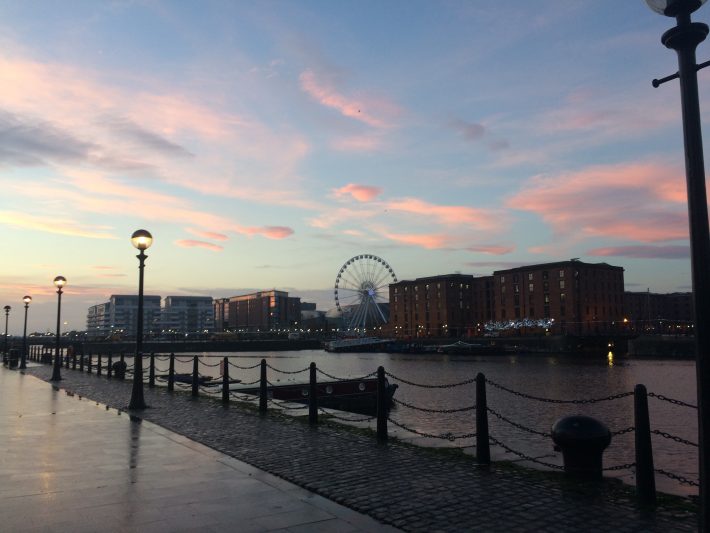Living in interesting times: monitoring the policy tides at the BES Annual Meeting
One good feature of the BES Annual Meeting is the chance it provides to get an overview of what’s happening in ecology.

I enjoy the chance to wander between sessions, and dip my toe in the water on a wide range of subjects. It has also been a chance, during this year’s BES Annual Meeting in Liverpool, to see what’s on our minds from a policy perspective. Although we’ve been discussing policy to an increasing extent at recent Annual Meetings, my impression is that the policy discussions and messages were more blatant this year than they’ve ever been. Nobody can accuse 2016 of being uneventful. In fact it has been so eventful, that many people are keen to see the back of it and open up the tabula rasa of 2017. But one thing is clear, now more perhaps than ever ecologists are discussing policy and what it means for them and their work.
The meeting kicked off with Mike Begon’s proposal that we’re now in a post-truth world. There’s now a need for ecologists to go beyond their comfort zone and find ways of communicating that appeal to people’s values and emotions, rather than focusing entirely on facts. I suppose this is linked to the increasing distrust of experts, and this message from Mike echoes the importance of how we communicate our messages to different audiences, a fact that came through loud and clear in the policy workshop at last year’s Annual Meeting in Edinburgh (the report of which can be found here). Clearly we need to get savvier about communicating in the policy arena, and at the same time I would say we have to make sure we have our key messages in our back pocket, ready for any opportunities that arise.
As a great pick-me-up following the well-attended/oiled gala dinner (do you get singing frogs at the ESA? I think not…), Alison Hester gave us an overview of the year in ecology, and a timely reminder of just how much has been happening in 2016. Although not forgetting the research highlights of 2016, Alison’s presentation was strongly dominated by policy issues, including climate change (and its increasing impacts on our environment), Scottish beavers, and the US presidential elections.
And of course, there’s Brexit. Not to be confused with breakfast. Brexit is not an elephant in the room – it’s such a vast elephant that it could have filled the venue’s arena, and even then it’s trunk would have been sticking out of one side and floating in the Albert Dock. The massive implications of Brexit hovered around many sessions, for example the agro-ecology sessions where at the back of many minds was the question “What’s going to happen to the CAP?” So what do we do about this policy pachyderm? How can we ecologists engage with this incredible process, which must be giving not a few civil servants some sleepless nights?
Enter stage left the BES Brexit Working Group, set up to provide additional focused guidance and support to the BES External Affairs Team during this extraordinary period. It’s still possible to apply to join this group, and more information about the group and the membership application process can be found here. One of the key goals for the Brexit Working Group is to gather the information that can sit in the Society’s back pocket, and an initial step in information gathering was taken through the policy team’s “Brexit lunch”. After some very helpful context setting by the Policy Team, four break-out groups considered the Brexit issues with respect to several different topics, including agricultural policy, conservation policy, and marine. Because things are going to move so swiftly in Brexit negotiations, and our opportunities to get our message across may be unpredictable and erratic, we have to be prepared.
This was one of a number of clear policy-related messages in the closing plenary from Hugh Possingham. Through an enthralling presentation filled with deft story-telling and some memorable one-liners (I am already ordering my “Taxation is civilisation” t-shirt in preparation for Ghent), Hugh took us into the world of trying to achieve genuine policy impact through the experiences of someone who has known both huge successes and some pretty substantial failures. One of the key messages from Hugh’s presentation was that you have to keep turning up: persistence and commitment is essential in developing the trust between researchers and policy makers that can be at the heart of rapid action. This message – keep turning up – was also emphasised strongly during our policy training day for early career researchers in Edinburgh in October, showing that there are some basic fundamental guidelines concerning science-policy communication which are widely applicable.
So, to end with some general impressions… Increasing discussion of policy at the Annual Meeting strengthens my conviction that the BES must be engaging with the policy arena; at a very basic level the Society needs to be engaged because as individual researchers we’re all going to have to do this, and to do it better. In addition the direction of travel of the Society’s policy work seems to be mapping well to the policy concerns of the Society’s membership, including the need to engage with policy in the devolved nations. And who knows, there may be more surprises around the corner: Scottish IndyRef2 anyone? So in true Baden Powell fashion we have to be prepared.
Finally, thanks to everyone that took the time to chat during the meeting, sharing their thoughts on various policy issues. Not least, I am grateful to my friend Erik Aschehoug for explaining the origins and complexities of the US Electoral College system, although perhaps we both need to get out more.
Like what we stand for?
Support our mission and help develop the next generation of ecologists by donating to the British Ecological Society.